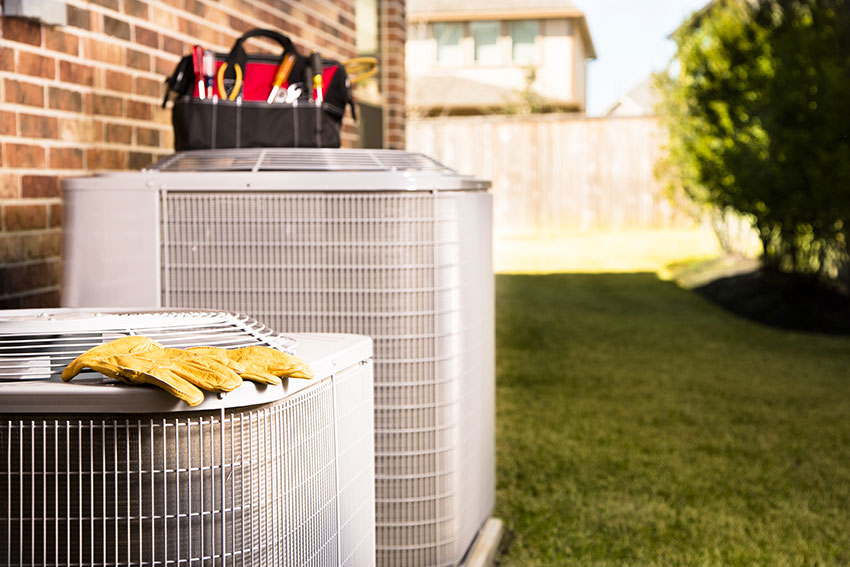How Long Should My HVAC System Last? (and Knowing It’s Time to Replace)

One of the most frequent questions our customers ask is: How long should I expect my system to last? and: When should I replace it?
As you might guess, a lot of factors determine the ultimate life of HVAC equipment and what your expectations should be. In this article we will break down the primary factors that affect the life of your system and when you should consider replacement over repair.
Nearly Anything CAN be Repaired (but that doesn’t mean it should be)
It’s important to note that nearly every piece of HVAC equipment under 20 years old CAN be repaired, but that doesn’t mean it should be. Sometimes the decision of repair vs. replace is simpler than others. But what happens when it’s not? The chart below is a handy reference to help you make a good decision.
The formula we recommend is to replace when the estimated repair cost exceeds 40% of the estimated absolute remaining value of the system. The estimated remaining value is calculated based on a zero value at 18 years (the average value for true end of life). For the chart below, the initial system value is set at $7,500. The repair threshold of 40% is used here because additional repairs typically follow the initial repair, and investing too much money in aged equipment rarely yields a positive financial outcome.
[The top row of this chart is the system age, and below that the remaining value of the system. On the left side is the repair cost.]
| System Age and Estimated Remaining Value | |||||||||
| 9 years $3500 | 10 years $3112 | 11 years $2724 | 12 years $2336 | 13 years $1984 | 14 years $1560 | 15 years $1172 | 18 years $0 | ||
| Repair Cost | $250 | Repair | Repair | Repair | Repair | Repair | Repair | Repair | Replace |
| $500 | Repair | Repair | Repair | Repair | Repair | Repair | Replace | Replace | |
| $750 | Repair | Repair | Repair | Repair | Repair | Replace | Replace | Replace | |
| $1000 | Repair | Repair | Repair | Replace | Replace | Replace | Replace | Replace | |
| $1500 | Repair | Replace | Replace | Replace | Replace | Replace | Replace | Replace | |
| $2000 | Replace | Replace | Replace | Replace | Replace | Replace | Replace | Replace | |
| $2500 | Replace | Replace | Replace | Replace | Replace | Replace | Replace | Replace | |
When a major component fails before any minor components and the overall equipment is beyond the expected service lifetime that’s a relatively easy decision. If you repaired the major component (like an indoor or outdoor coil or compressor), you could expect that other minor or major components would also not be expected to last indefinitely. n some cases a specific failure and the condition of the
Conditions that Affect the Life of Your HVAC System
- Proper Sizing: The proper sizing of equipment is important. If your equipment is undersized, it will run flat out and wear itself out too early, if it’s oversized, it will “short cycle” (see One Stage, Two Stage, and Variable Speed) and also wear out early. Being sized just right balances the total running hours and the number of start/stops for optimal energy usage and equipment longevity.
- Environment: The environment where you live will affect the life expectancy of your equipment. A coastal environment, for example, exposes your system to corrosive elements that dramatically affects the life of all types of metals that are present throughout the system from electrical components to the coils.
- Regular Service: Like anything mechanical, properly maintaining your equipment can dramatically increase its life expectancy. Maintenance helps your system to work more efficiently and also ensures that minor problems are corrected before they lead to larger issues.
- Proper Installation: Most customers think that getting the best price for their equipment is the most important decision. While that’s certainly important, a quality installation is even more important to make the best financial choice.
- Equipment Type and Quality: It goes without saying that not all equipment is created equal. The top tier of equipment will generally last longer than the rest of the field and will be better support their dealers. This top tier includes Carrier® and Trane® and their sub-brands (such as Payne, American Standard, etc). Some brands generally associated with lower quality “budget” equipment are Goodman, Amana, Coleman, etc. Most equipment has broadly similar manufacturing, so the installation and support from your dealer will be most important to longevity.
- Energy Usage: While not directly related to the function of the equipment, many homeowners expedite their decision to replace their equipment due to the increased efficiency available with new equipment, even if repair is still a viable option.
Summing it Up
With all that being said, you are probably most interested in real observations and anecdotes from the field. So what’s the best equipment, and what will last the longest?
If you live in a moderate environment and climate, buy quality equipment, and have it sized, installed and maintained properly– You should expect no less than 15 years of lifetime from your investment. With a little luck, you could get 20 years.
On the other hand… Improperly installed, incorrectly sized, and poor quality equipment may not last longer than 10 years. In any case, you should expect at least 10 years from nearly any combination of factors. In fact from what we’ve seen, it’s very rare in the Raleigh, Durham, Cary area to see equipment that doesn’t last at least 10 years.



